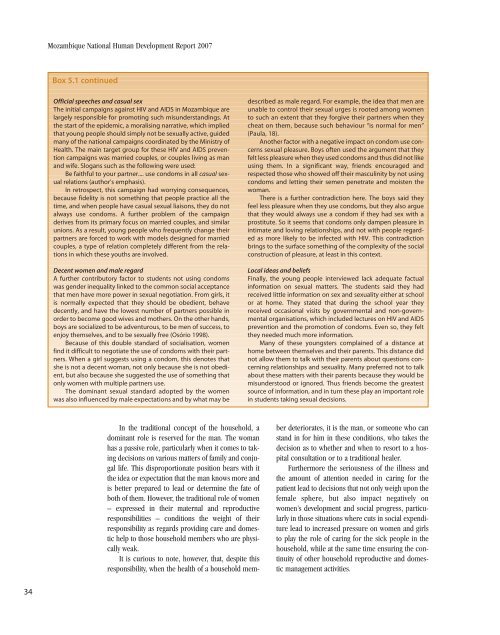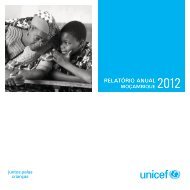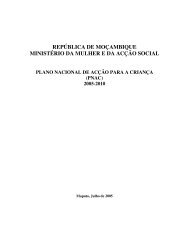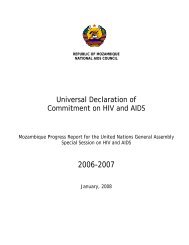English language version - Human Development Reports - United ...
English language version - Human Development Reports - United ...
English language version - Human Development Reports - United ...
- No tags were found...
You also want an ePaper? Increase the reach of your titles
YUMPU automatically turns print PDFs into web optimized ePapers that Google loves.
Mozambique National <strong>Human</strong> <strong>Development</strong> Report 2007Box 5.1 continuedOfficial speeches and casual sexThe initial campaigns against HIV and AIDS in Mozambique arelargely responsible for promoting such misunderstandings. Atthe start of the epidemic, a moralising narrative, which impliedthat young people should simply not be sexually active, guidedmany of the national campaigns coordinated by the Ministry ofHealth. The main target group for these HIV and AIDS preventioncampaigns was married couples, or couples living as manand wife. Slogans such as the following were used:Be faithful to your partner.... use condoms in all casual sexualrelations (author’s emphasis).In retrospect, this campaign had worrying consequences,because fidelity is not something that people practice all thetime, and when people have casual sexual liaisons, they do notalways use condoms. A further problem of the campaignderives from its primary focus on married couples, and similarunions. As a result, young people who frequently change theirpartners are forced to work with models designed for marriedcouples, a type of relation completely different from the relationsin which these youths are involved.Decent women and male regardA further contributory factor to students not using condomswas gender inequality linked to the common social acceptancethat men have more power in sexual negotiation. From girls, itis normally expected that they should be obedient, behavedecently, and have the lowest number of partners possible inorder to become good wives and mothers. On the other hands,boys are socialized to be adventurous, to be men of success, toenjoy themselves, and to be sexually free (Osório 1998).Because of this double standard of socialisation, womenfind it difficult to negotiate the use of condoms with their partners.When a girl suggests using a condom, this denotes thatshe is not a decent woman, not only because she is not obedient,but also because she suggested the use of something thatonly women with multiple partners use.The dominant sexual standard adopted by the womenwas also influenced by male expectations and by what may bedescribed as male regard. For example, the idea that men areunable to control their sexual urges is rooted among womento such an extent that they forgive their partners when theycheat on them, because such behaviour “is normal for men”(Paula, 18).Another factor with a negative impact on condom use concernssexual pleasure. Boys often used the argument that theyfelt less pleasure when they used condoms and thus did not likeusing them. In a significant way, friends encouraged andrespected those who showed off their masculinity by not usingcondoms and letting their semen penetrate and moisten thewoman.There is a further contradiction here. The boys said theyfeel less pleasure when they use condoms, but they also arguethat they would always use a condom if they had sex with aprostitute. So it seems that condoms only dampen pleasure inintimate and loving relationships, and not with people regardedas more likely to be infected with HIV. This contradictionbrings to the surface something of the complexity of the socialconstruction of pleasure, at least in this context.Local ideas and beliefsFinally, the young people interviewed lack adequate factualinformation on sexual matters. The students said they hadreceived little information on sex and sexuality either at schoolor at home. They stated that during the school year theyreceived occasional visits by governmental and non-governmentalorganisations, which included lectures on HIV and AIDSprevention and the promotion of condoms. Even so, they feltthey needed much more information.Many of these youngsters complained of a distance athome between themselves and their parents. This distance didnot allow them to talk with their parents about questions concerningrelationships and sexuality. Many preferred not to talkabout these matters with their parents because they would bemisunderstood or ignored. Thus friends become the greatestsource of information, and in turn these play an important rolein students taking sexual decisions.In the traditional concept of the household, adominant role is reserved for the man. The womanhas a passive role, particularly when it comes to takingdecisions on various matters of family and conjugallife. This disproportionate position bears with itthe idea or expectation that the man knows more andis better prepared to lead or determine the fate ofboth of them. However, the traditional role of women– expressed in their maternal and reproductiveresponsibilities – conditions the weight of theirresponsibility as regards providing care and domestichelp to those household members who are physicallyweak.It is curious to note, however, that, despite thisresponsibility, when the health of a household memberdeteriorates, it is the man, or someone who canstand in for him in these conditions, who takes thedecision as to whether and when to resort to a hospitalconsultation or to a traditional healer.Furthermore the seriousness of the illness andthe amount of attention needed in caring for thepatient lead to decisions that not only weigh upon thefemale sphere, but also impact negatively onwomen’s development and social progress, particularlyin those situations where cuts in social expenditurelead to increased pressure on women and girlsto play the role of caring for the sick people in thehousehold, while at the same time ensuring the continuityof other household reproductive and domesticmanagement activities.34
















